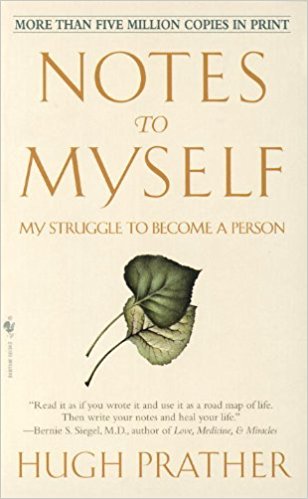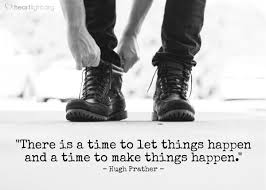Author: Hugh Prather
Genre: Self-Help

Notes to Myself, Hugh Prather’s first book is, in reality, a journal. A place where he kept writing his deepest thoughts, his pains and problems in the course of everyday living. The book was finally published in 1970 after multiple rejections but, just within a few years, worked its way to become a best-seller with more than 5 million copies sold.
The book is a series of short, one paragraph observations that chronicle his tribulations and development as a man. Everyday feelings and introspections are honestly evaluated and diligently penned down. It is the journey of a man whose personality is not yet defined and who is still experimenting on his approach towards life. Hugh’s concerns would be common to any young reader: career and life uncertainty, anxiety of not being good enough, the “longing to know oneness” with the loved ones, and even questions around sexual expression. It was a time when he was trying to find his individual goal in the larger scheme of the world.
The book has no page numbers, you read each thought in bits and pieces and then chew upon it and let it sink in. In fact, depending on how you are feeling on a particular day, you go back to the book for those thoughts, as a comfort that you are not alone in this world.
Some of his gems, faithfully reproduced verbatim:

Anxiety:
I’m convinced that this anxiety running through my life is the tension between what I “should be” and what I am. My anxiety doesn’t come from thinking about the future but from wanting to control it.
“It will be interesting to see what happens” is a more realistic attitude toward future consequences than worry… Tomorrow is shallow, but today is as deep as truth.
My trouble is I analyze life instead of live it.
The problem will be solved when I accept that happiness is a present attitude, not a future condition.
Most mistakes are corrected through increased awareness, which usually does not come without some discomfort.
She (a loved one) may die before morning. And I may die before morning. What I must do is die now. I must accept the justice of death and the injustice of “more life”… As of this moment I give up my “right” to live. And I give up my “right” to her life.
Social recognition:
After I had written this book I told several friends. Their reaction was polite and mild. Later I was able to tell them the book was going to be published. Most of them responded with the words, “I am proud of you.” Proud of the results but not of the action.
The principle seems to be: It’s a fault if I am also capable of it, a disease if I am not.
My saying “and” and “uh” (between sentences) results from my need to answer immediately, to speak without any break, as if taking time to know what I want to say were embarrassing. Interpreting the pause is their problem.
The way to be most helpful to others is for me to do the thing that right now would be most helpful to me.
There is something about compliments that scares me. Part of the reason may be that I am afraid of getting something that can be subsequently taken away.
I used to dislike social functions… What I didn’t realize was that I hated having to shield myself… Now that I… allow others to like or dislike me as they choose, I have lost much of this (social) aversion.
My friendship… seems to typify a dynamic… At first we saw only each other’s virtues. Now we are seeing only each other’s faults. If we make it through this latter stage, maybe we will see each other and truly be friends.
Life Choices:
There is a part of me that wants to write, a part that wants to theorize, a part that wants to sculpt, a part that wants to teach… To force myself into a single role, to decide to be just one thing in life, would kill off large parts of me.
The number of things just outside the perimeter of my financial reach remains constant no matter how much my financial condition improves.
It’s not that we fear the place of darkness but that we don’t think we are worth the effort to find the place of light.
Selfishness is neither good nor bad—it depends on the way we are selfish as to whether it nourishes or injures.
Hugh has brilliantly captured private thoughts of the entire human species. My own reaction after reading it was, “why couldn’t/didn’t I write this!” So much of what he said was a reflection from my own life, and I would wager, anyone’s life. Unfortunately, in our fast-paced world, the daily rigamorale of coarse existence leaves hardly any time for introspection and reflection. So, what seems to be a trip inside Hugh Prather’s mind is really a trip into our own.
What could be better: Sometimes I do wonder if too much of an “acceptance” attitude could also lead us to mediocrity? It would make us calmer and perhaps even happier, as in more at peace with what we have. But could it make us less of an achiever? The world is a competitive place, and often when we force us to be fixated at results, and not actions, we make better plans to succeed. But then perhaps, there is a higher level of duality (Krishna!) that the imperfect me is still not comprehending

Why read this book: Many of us are in the same situation where Hugh once was. Many internal dilemmas that we have been consciously or subconsciously thinking, but generally ignoring, find a resting place in this book. Illuminated by clear thinking and authentic writing. The book can be our companion in the noble and rewarding journey to “know thyself”, for isn’t that true wisdom?
Goodreads Link: Notes to Myself: My Struggle to Become a Person by Hugh Prather | Goodreads

 This information will never be shared with third party
This information will never be shared with third party
Well written Nishant. “Know thyself” is what Socrates distilled all that was written in the domain of psychology and philosophy in the world.
People need to appreciate the aspect of the Third Space when they read your comment on ” what could be better”. Dealing with dualities ( either or thinking ….acceptance attitude or achievement) requires the development of complex thinking to find the third space. Where it becomes possible to do both – acceptance and achievement. This is what development is all about – developing the capability to find the third space.
I read this book long back. But I still remember it and have incorporated it in my life. This book will force you to think about your day to day life in different perspective.
It is after all the depth of our thoughts which tell us to be more human which sometimes we forget in the pursuit of happiness.
The verbatim part hit really close to home…. Might as well read this book…
Really well constructed review!
This is very much relatable, really like the flow and perspective.
Reading your review about this book made me curious to read this book..!
Relatable. As it tells about important things in life, with a combination of simplicity and wisdom.